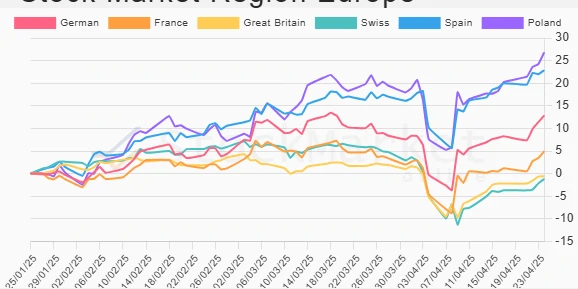April 25, 2025 a 03:31 pm




EU Countries - Performance Analysis

📊 Evaluating recent trends, the European markets have shown varied performances over different time frames. With Germany and Poland frequently at the forefront, it's clear that certain markets are benefiting from unique economic conditions. Conversely, countries like Switzerland displayed more tempered performances, signaling potential macroeconomic challenges.
EU Countries Performance One Week
| Country | Performance (%) | Performance |
|---|---|---|
| Poland | 6.57 | |
| Germany | 4.58 | |
| France | 3.79 | |
| Spain | 2.87 | |
| Swiss | 2.52 | |
| Great Britain | 1.59 |

EU Countries Performance One Month
| Country | Performance (%) | Performance |
|---|---|---|
| Poland | 7.41 | |
| Spain | 6.23 | |
| Germany | 3.92 | |
| France | 1.27 | |
| Great Britain | -2.87 | |
| Swiss | -6.77 |

EU Countries Performance Three Months
| Country | Performance (%) | Performance |
|---|---|---|
| Poland | 26.80 | |
| Spain | 22.87 | |
| Germany | 12.83 | |
| France | 4.95 | |
| Great Britain | -0.61 | |
| Swiss | -1.19 |

Summary
✅ The data presents Poland as the standout performer over all timeframes, indicating robust economic momentum. Germany and Spain also showed consistent positive trends, while Switzerland encountered some downturns. The mixed performances across regions reflect different underlying factors, possibly ranging from economic indicators to geopolitical dynamics. This diverse landscape underscores the importance of tailored investment strategies per country. For investors, a nuanced understanding of these temporal changes is paramount for capitalizing on opportunities and mitigating risks across diverse European markets.
